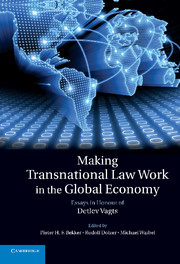Book contents
- Frontmatter
- Contents
- List of contributors
- Foreword: the transnationalism of Detlev Vagts
- List of cases cited
- List of abbreviations and acronyms
- Introduction: a Festschrift to celebrate Detlev Vagts' contributions to transnational law
- 1 Detlev Vagts and the Harvard Law School
- 2 Constructing and developing transnational law: the contribution of Detlev Vagts
- I International law in general
- 3 ‘Hegemonic international law’ in retrospect
- 4 Textual interpretation and (international) law reading: the myth of (in)determinacy and the genealogy of meaning
- 5 The changing role of the State in the globalising world economy
- 6 Sources of human rights obligations binding the UN Security Council
- 7 Is transnational law eclipsing international law?
- 8 Participation in the World Trade Organization and foreign direct investment: national or European Union competences
- 9 From dualism to pluralism: the relationship between international law, European law and domestic law
- 10 Transnational law comprises constitutional, administrative, criminal and quasi-private law
- 11 Founding myths, international law, and voting rights in the District of Columbia
- 12 The tormented relationship between international law and EU law
- 13 International law scholarship in times of dictatorship and democracy: exemplified by the life and work of Wilhelm Wengler
- II Transnational economic law
- III Transnational lawyering and dispute resolution
- Bibliography of Detlev Vagts
- Index
10 - Transnational law comprises constitutional, administrative, criminal and quasi-private law
from I - International law in general
Published online by Cambridge University Press: 17 November 2010
- Frontmatter
- Contents
- List of contributors
- Foreword: the transnationalism of Detlev Vagts
- List of cases cited
- List of abbreviations and acronyms
- Introduction: a Festschrift to celebrate Detlev Vagts' contributions to transnational law
- 1 Detlev Vagts and the Harvard Law School
- 2 Constructing and developing transnational law: the contribution of Detlev Vagts
- I International law in general
- 3 ‘Hegemonic international law’ in retrospect
- 4 Textual interpretation and (international) law reading: the myth of (in)determinacy and the genealogy of meaning
- 5 The changing role of the State in the globalising world economy
- 6 Sources of human rights obligations binding the UN Security Council
- 7 Is transnational law eclipsing international law?
- 8 Participation in the World Trade Organization and foreign direct investment: national or European Union competences
- 9 From dualism to pluralism: the relationship between international law, European law and domestic law
- 10 Transnational law comprises constitutional, administrative, criminal and quasi-private law
- 11 Founding myths, international law, and voting rights in the District of Columbia
- 12 The tormented relationship between international law and EU law
- 13 International law scholarship in times of dictatorship and democracy: exemplified by the life and work of Wilhelm Wengler
- II Transnational economic law
- III Transnational lawyering and dispute resolution
- Bibliography of Detlev Vagts
- Index
Summary
Introduction: transnational law oversteps traditional categories
In their book Transnational Legal Problems, first published in 1968, Detlev Vagts and Henry Steiner espoused Philip Jessup's term ‘transnational law’ as ‘more than congenial’ to them. ‘Transnational law’ was meant by Jessup ‘to include all law which regulates actions or events that transcend national frontiers. Both public and private international law are included, as are other rules which do not wholly fit into such standard categories’. In their seminal book, Steiner and Vagts sought to give principal attention to problems that were ‘relevant not only to governments but also to the private participants – individual or corporate – in transnational life’. They defied ‘rigid compartments’, and instead dealt with all kinds of legal issues, including foreign investment and multinational enterprises (MNEs), ‘on a spectrum between the extremes of “national” and “international” law, or on one between “private” and “public” law’.
With that approach, Detlev Vagts contributed to overcoming the public–private split in international law. That catchword denotes the distinction between a public and a private realm of life, and goes hand in hand with the distinction between State and society, or between State and market. The blurring of these spheres seems particularly obvious with regard to economic law, and has been reinforced by the phenomenon which became generally known as globalisation in the 1990s. But although the erosion of the public–private split can usefully be captured with the notion ‘transnational’, conceptual ambiguities and potential misunderstandings with regard to the key terms remain.
- Type
- Chapter
- Information
- Making Transnational Law Work in the Global EconomyEssays in Honour of Detlev Vagts, pp. 154 - 173Publisher: Cambridge University PressPrint publication year: 2010
- 1
- Cited by



